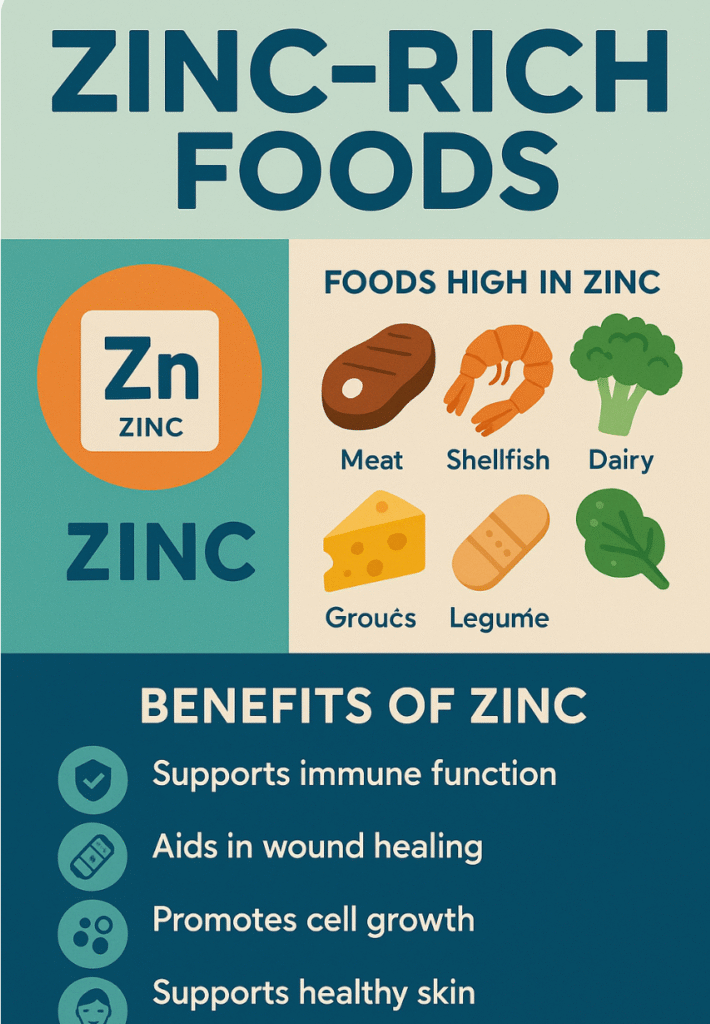Zinc is one of the most critical trace minerals required by the human body, yet it is often overlooked in everyday nutrition. Unlike macronutrients such as carbohydrates or proteins, zinc is needed in small amounts, but its impact on overall health is profound. From supporting immune defense to aiding in cell repair, zinc is a cornerstone of human physiology.
Why Zinc Matters
1. Immune Function
Zinc is indispensable for a healthy immune system. It activates immune cells, helping the body fight off infections. Zinc deficiency is strongly linked with increased vulnerability to pneumonia, colds, and other infectious diseases. NIH resource on Zinc and Immunity.
2. Wound Healing and Skin Health
Zinc contributes to tissue repair and collagen synthesis. Hospitals often use zinc supplements in treating burns, ulcers, and chronic wounds. It also regulates oil gland activity, making it essential for skin health and acne management.
3. Cell Growth and Development
As a cofactor in over 300 enzymes, zinc influences cell division, protein synthesis, and DNA repair. Adequate zinc is particularly crucial for growth in children, reproductive health, and healthy aging.
4. Neurological and Cognitive Support
Zinc plays a role in neurotransmitter function and brain signaling. Studies suggest that zinc deficiency may contribute to mood disorders and cognitive decline.
Best Sources of Zinc
Zinc is not produced naturally in the body, so it must come from diet:
- Meat: Beef, lamb, and pork are among the richest sources.
- Shellfish: Oysters are particularly high in zinc.
- Legumes: Chickpeas, lentils, and beans provide plant-based options.
- Dairy & Eggs: Cheese, yogurt, and eggs add moderate amounts.
- Nuts & Seeds: Pumpkin seeds, cashews, and almonds are excellent sources.
Vegetarians and vegans should be mindful, as plant-based sources of zinc are less bioavailable due to phytates that block absorption.
How Much Zinc Do You Need?
The Recommended Dietary Allowance (RDA) for zinc varies by age and gender:
- Men: 11 mg/day
- Women: 8 mg/day
- Pregnant women: 11–12 mg/day
- Children: 2–9 mg/day (based on age)
Excess zinc intake can be harmful, leading to nausea, impaired immunity, and even copper deficiency. Supplementation should always be balanced and, ideally, physician-guided.
Zinc Deficiency: A Hidden Global Problem
According to the World Health Organization (WHO), nearly 17% of the global population is at risk of zinc deficiency. Symptoms include:
- Frequent infections
- Delayed wound healing
- Hair loss
- Loss of appetite
- Impaired growth in children
Addressing zinc deficiency is considered one of the most effective global health interventions.
Conclusion
Zinc is more than a trace mineral—it is a fundamental nutrient that supports immune resilience, growth, repair, and brain function. Ensuring sufficient zinc intake through diet or supplements is a critical step toward long-term health and vitality.
🇰🇷 Premium Korean Ginseng Online Shop







